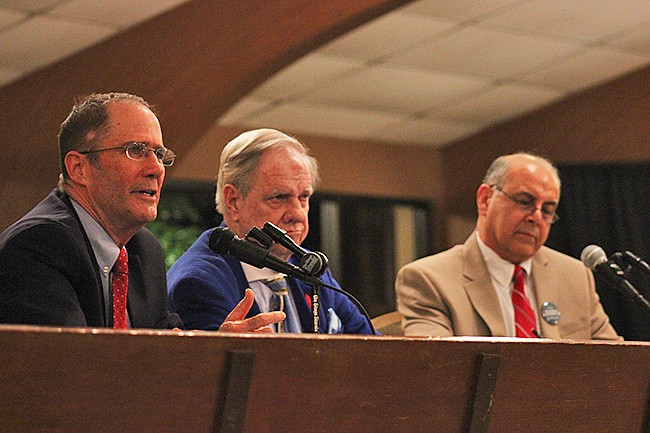- April 19, 2024
-
-
Loading

Loading

Maitland candidates Mike Dabby and Mike Thomas took to the mic on Thursday in their first debate in the race for the city’s one open City Council seat.
During the discussion at the Maitland Civic Center-Venue on the Lake, Dabby and Thomas set out to distinguish themselves from each other – both having the same first name and being members of the city’s Planning & Zoning Commission.
“Whoever wins there's going to be more Mikes and less hair on City Council,” joked candidate Mike Thomas.
One of the biggest differences between the two candidates is their backgrounds. Thomas made a name for himself during his near 30-year tenure as a reporter and columnist for the Orlando Sentinel, and later as a top policy advisor in county government. Dabby has worked as a real estate appraiser and land consultant for three decades, and served on various Maitland city boards for more than 10 years.
In the debate the candidates answered questions from residents, hitting on the city’s hottest topics including traffic and development.
Development
The key to getting downtown development moving, Thomas said, is for the city of Maitland to decide what it actually wants to see developed and make it happen, and stop scaring away developers with indecisiveness.
“We've seen every other community around us develop downtowns and new areas…and we just sat here,” Thomas said. “…Instead of having this unified vision we just have this battle over every parcel.”
Thomas said he would like to see Maitland come up with a clear and consistent vision of what it wants, instead of changing its mind halfway through the process. He said the city needs to find a way to get rid of its nickname as “Wait-land” by speeding up the process and making developers’ jobs easier.
“We’ve got to get beyond that or we’re going to just be constantly fighting and hassling and living with undeveloped sites [downtown],” he said.
Dabby said to get the quality development Maitland wants, the city needs to be open to negotiations with developers to make the best projects possible.
“We’re not an isolated community that is stagnant,” Dabby said. “We are growing. We want to grow.”
To do that, Dabby said, the city can tighten up its codes to outline what the community would like to see develop over the long-term.
To grow the west side of the city, Dabby said, the city needs to encourage existing and interested property owners to pursue higher-density redevelopment at the aging Maitland Center. When it comes to needed infrastructural improvements, two ways the city could look into funding the improvements, he said, could be to create a second Community Redevelopment Agency, or to implement a special taxing district where those in the district pay for the area’s infrastructural improvements.
“What we need to do is enhance the opportunities at Maitland Center to increase [ad valorem] revenue,” Dabby said. “…Because in a couple years if we don't do something we're going to be in a serious financial state.”
Thomas said he foresees a private developer coming in and improving the Maitland Center area with a development more desirable and suitable for the current market. And when that happens, he said, the city needs to be willing to work with them on zoning and density to make sure they can make the development successful. But, he said, when it comes to the city investing its own money in the area, that should be limited to funding necessary infrastructure improvements.
Traffic
The candidates were asked for their thoughts on what resident John Peele referred to as “malfunction junction” in Maitland – the intersection of U.S. Highway 17-92 and Horatio Avenue coming from Maitland Avenue.
Dabby, who has served on the city’s Transportation Advisory Board, said traffic troubles – including at that intersection – are some of the most common complaints he’s heard from residents during his campaign.
Dabby said he is in favor of narrowing down Maitland Avenue to turn it into a “local road” more leisurely enjoyed by Maitland residents – instead of as a cut-through to and from Maitland Boulevard and 17-92.
“I know its not popular, but in the bigger scheme of things and in the longer run it will work if we don't close Horatio Avenue down altogether from Maitland Avenue to 17-92 and continue to allow all movements of traffic,” Dabby said.
Thomas said he is not in favor of making any changes to the width of Maitland Avenue until the I-4 Ultimate renovations are complete. If any work was done before then, he said, “It would be a disaster.”
He said by limiting traffic on Maitland Avenue, it would just be squeezed onto other roads.
“And a lot of times where you squeeze that is into neighborhoods,” he said. “…The traffic doesn't go away, it just pops up somewhere else.”
To protect the neighborhoods, Thomas said Maitland should wait on making any major traffic changes to Maitland Avenue until after downtown is developed and Ultimate I-4 is complete.
Dabby said he hopes as Maitland’s downtown develops, some of the traffic will pop up in the form of pedestrians and cyclists. In future, he said the city needs to figure out how to connect the Maitland SunRail station with downtown, and how to safely get pedestrian and cycling traffic across 17-92.
Residents can walk, pedal or drive to Maitland Community Park through March 13 to cast their votes early before the March 15 election. On Election Day, polls across the city will be open from 7 a.m. to 7 p.m.